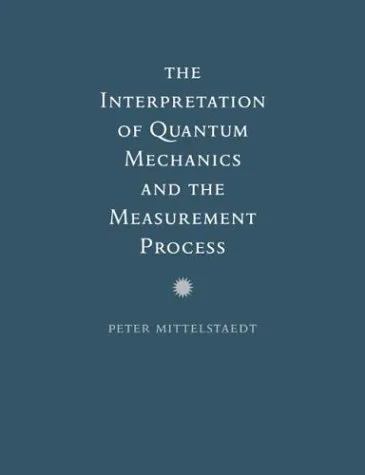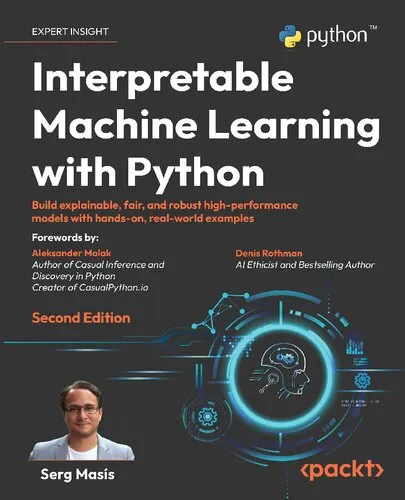The Interpretation of Quantum Mechanics and the Measurement Process
4.5
Reviews from our users

You Can Ask your questions from this book's AI after Login
Each download or ask from book AI costs 2 points. To earn more free points, please visit the Points Guide Page and complete some valuable actions.Related Refrences:
Introduction to "The Interpretation of Quantum Mechanics and the Measurement Process"
Quantum mechanics, as one of the most profound and intricate fields of modern science, has revolutionized the way we perceive the universe. At its core lies a fascinating riddle: the measurement problem. My book, "The Interpretation of Quantum Mechanics and the Measurement Process", delves into this critical topic, bridging the philosophical underpinnings of quantum theory with its experimental manifestations. This book is designed to engage physicists, philosophers, and the scientifically curious, taking readers on a journey across the conceptual landscape of quantum mechanics.
The goal of this book is not merely to present the mathematical formalisms of quantum theory but to explore the deeper implications of its interpretation and the mysteries surrounding the act of measurement. This work synthesizes decades of discussion, research, and debate around a pivotal question: how do quantum systems transition from the indeterminate, probabilistic world of superpositions to the experimentally observed, classical-like outcomes?
Detailed Summary of the Book
My book begins with a historical overview of quantum mechanics, setting the stage for understanding the foundational debates and the significance of the measurement process. From the early ideations of Planck and Einstein to the formalization of quantum mechanics by Schrödinger, Heisenberg, and Dirac, I trace the development of the theory while highlighting the philosophical questions that emerged at each stage.
The central chapters focus on the measurement problem: the phenomenon wherein a quantum system is observed, causing its wavefunction to "collapse" into a definite state. By introducing different interpretation frameworks, such as the Copenhagen interpretation, many-worlds interpretation, and objective collapse theories, the book carefully examines how each approach addresses (or fails to address) the measurement problem. Mathematical details are provided for readers who are familiar with the formal aspects of quantum theory without overwhelming those more focused on the conceptual landscape.
Later chapters move into the implications of quantum mechanics for reality, causality, and information. Discussions include quantum entanglement, non-locality as demonstrated in Bell's theorem, and the philosophical implications for determinism and free will. The book concludes with an exploration of emerging ideas and how future experiments might unlock new answers to the questions quantum mechanics leaves open today.
Key Takeaways
- Quantum mechanics is not just a physical theory but a conceptual revolution that challenges our understanding of reality and observation.
- The measurement problem lies at the heart of the quantum enigma, and different interpretations offer strikingly varied ways of understanding this phenomenon.
- Philosophical considerations, such as the nature of reality, causation, and determinism, are integral to the interpretation of quantum mechanics.
- Emerging experimental technologies and interdisciplinary approaches are transforming how quantum mechanics and its interpretations are studied.
Famous Quotes from the Book
“At the boundary of measurement, quantum mechanics meets philosophy, and the act of observing unveils the canvas of reality itself.”
“The quantum world oscillates between determinism and randomness, offering not certainty but probabilities.”
“Understanding quantum mechanics ultimately requires more than mathematics—it demands imagination and philosophical reflection.”
Why This Book Matters
"The Interpretation of Quantum Mechanics and the Measurement Process" matters because it tackles one of the most profound questions in modern science: what does quantum mechanics tell us about the nature of reality? By addressing the conceptual and philosophical dimensions of quantum phenomena, this book invites readers to think deeply about the implications of science beyond mere equations and predictions.
The growing relevance of quantum technology in fields such as cryptography, computing, and communication renders these discussions more important than ever. While engineers and technologists are harnessing quantum principles to achieve groundbreaking innovations, it remains essential to ask: What does this tell us about the fabric of the universe, and how should we interpret the mysteries highlighted by quantum theory?
Finally, this book highlights the multidisciplinary nature of quantum mechanics, bridging physics with philosophy, mathematics, and even the cognitive sciences. To understand the quantum realm is to challenge preconceptions and embrace uncertainty—a task not only worthwhile but urgent in the burgeoning age of quantum technologies.
Free Direct Download
You Can Download this book after Login
Accessing books through legal platforms and public libraries not only supports the rights of authors and publishers but also contributes to the sustainability of reading culture. Before downloading, please take a moment to consider these options.
Find this book on other platforms:
WorldCat helps you find books in libraries worldwide.
See ratings, reviews, and discussions on Goodreads.
Find and buy rare or used books on AbeBooks.
1284
بازدید4.5
امتیاز0
نظر98%
رضایتReviews:
4.5
Based on 0 users review
Questions & Answers
Ask questions about this book or help others by answering
No questions yet. Be the first to ask!





![The Ultimate iOS Interview Playbook: Conquer Swift, frameworks, design patterns, and app architecture [Team-IRA]](https://s3.refhub.ir/images/thumb/The_Ultimate_iOS_Interview_Playbook__Conquer__29925.webp)







